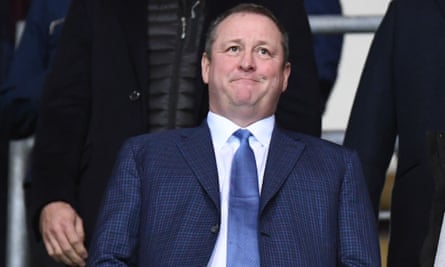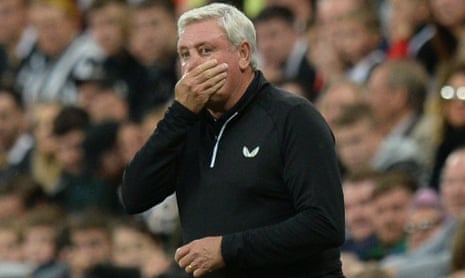Mike Ashley is often described as brass-necked but behind the brash and brazen exterior Newcastle’s owner can also be extremely thin-skinned. A prime example of this paradox is to be found between the lines of the club’s recent 768-word statement attempting to justify a transfer window featuring one senior signing and a slashing of the wage bill.
“Internally, all parties have long been aware of the budgetary parameters under which we are operating,” went one significant sentence in the unsigned missive to those supporters underwhelmed by the lack of incomings.
Admittedly, the former Arsenal midfielder Joe Willock cost £22m but he spent half of last season on loan at St James’ Park so could hardly be regarded as a newcomer. Throw in the departures of, among others, Andy Carroll, Florian Lejeune and Christian Atsu as £200,000 a week was trimmed from the payroll and it seems no surprise Steve Bruce made his disappointment plain.
Bruce’s problem is that Ashley likes his managers to keep their heads down. The retail tycoon did not relish being backed, repeatedly, into corners by the politically wily Rafael Benítez and had not expected his generally much more compliant successor to threaten to throw his toys out of the pram over Newcastle’s failure to borrow Hamza Choudhury from Leicester.
Bruce, in letting it be known, albeit discreetly, that the midfielder was the much-craved enforcer capable of transforming his team’s fortunes, broke an unwritten rule that Newcastle managers are best seen and not heard.
A firm rebuke has been delivered in the form of that statement, emphasising Ashley’s belief the squad is good enough to hold its own. “Our commitment to being run in a sustainable manner, which secures the financial viability of the club, does not come at the expense of being ambitious,” it said. “It is built on the core principle that we spend what we have.”

After detailing Covid’s detrimental financial impact, the missive proceeded to explain that – unusual for Newcastle but common elsewhere – Willock’s fee was being paid in instalments as they could not afford the full amount.
“All parties were aware as to the implications for further squad consolidation,” it said. “Having finished last season 12th in the Premier League the club maintains a strong belief in its current squad. We have a talented and committed group of players who have shown they are fully capable of delivering.”
The debate about whether Newcastle’s squad is over or underachieving polarises local opinion but many supporters are convinced Bruce is not getting the best out of several players, perhaps most notably Sean Longstaff.
Choruses of “We want Brucie out” began as early as the 25th minute of last month’s 2-2 draw with Southampton at St James’ Park and, with the team still seeking their first win, that could well resurface in the away end at Manchester United on Saturday. Old Trafford on the afternoon of Cristiano Ronaldo’s welcome home is probably the last place Newcastle’s manager wants to be but anyone suspecting Bruce may be tempted to resign is almost certainly wide of the mark.
True, he walked out on Hull in disgust at a lack of transfer activity in the summer of 2016 but Newcastle’s squad, for all its lack of central-defensive pace, midfield muscle and attacking cover for Callum Wilson, is far from the top-flight’s weakest. Crucially, the context is also very different.
It is possible the blocked Saudi Arabian-led takeover may happen this year. On 27 September, the Competitions Appeals Tribunal is scheduled to hear Ashley’s case for damages against the Premier League for its part in the collapse of that proposed buyout last summer. Should he win, the sale could conceivably be completed before the separate arbitration hearing Ashley is pursuing against the league opens in the new year.
Perhaps tellingly, in July the culture secretary, Oliver Dowden, urged the Premier League to act as quickly as possible in making a final decision on a takeover that would involve the Saudis investing hundreds of millions of pounds into regeneration projects across north-east England.
If, and it remains a big if, Newcastle changes hands, Bruce would almost certainly be replaced – but not before receiving a generous payoff believed to be worth up to three years’ salary. That clause is understood to have been negotiated when he took the job and could explain Ashley’s reluctance to sack him despite the deteriorating results last winter.
Everything remains stuck in limbo with the impasse ably explained on the closing page of the marvellous new book Newcastle United Stole My Heart, Sixty Years in Black and White by Michael Chaplin, the celebrated playwright and television scriptwriter.
Chaplin has not attended a home game since surrendering his season ticket in disgust in 2019 and, when asked whether that will change, provides the following answer: “If this zombie club eventually finds an owner who terminates its apparently endless living death, who truly respects it, the city, its players and supporters, the answer is simply – yes, in an instant.”
In the interim, Bruce, Willock and perhaps even the Premier League’s chief executive, Richard Masters, remain pawns in a wider geopolitical drama revolving around the United Kingdom’s unfailingly complex relationship with Saudi Arabia.
